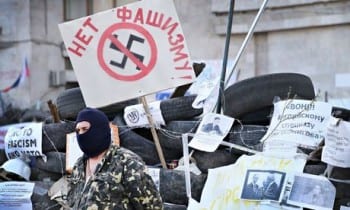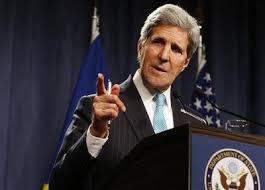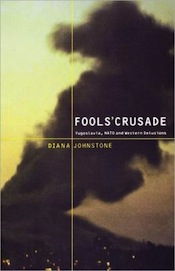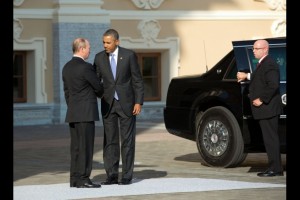Taking the Low Road to War
The lies, propaganda and rank hypocrisy emanating from Washington, and echoed by the US corporate media regarding events in Ukraine are stunning and would be laughable, but for the fact that they appear to be aimed at conditioning the US public for increasing confrontation with Russia – confrontation which could easily tip over the edge into direct military conflict, with consequences that are too dreadful to contemplate.
It would be beyond ironic if, a quarter of a century after the collapse of the Soviet Union and the end of nearly half a century of Cold War and Mutual Assured Destruction, during all of which time US and Russian soldiers never fought against each other, we now ended up with soldiers from our two countries actually doing battle with each other, instead of just fighting proxy wars.
For now, perhaps out of sheer unwillingness to accept that dreadful possibility, I’m choosing to look for the humor in this conflict.
When it comes to the US, the laughs are easy to find.
Start with Vice President Joe Biden, a guy who has always been hard to take seriously. I mean, we’re talking about a politician who in 1988 had to quit running for president when he was caught lifting his life story from British Labor Party leader Neil Kinnock.
Still, Biden outdid even himself on his current visit to Ukraine when he called on Russia to back off in its support of pro-Russian separatists in Eastern Ukraine saying that, “No nation should threaten its neighbors by amassing troops along the border.”
This from the man who is one heartbeat from the presidency of a nation that doesn’t just have an army and a navy and an airforce along its southern shore threatening its neighbor Cuba, but actually has its navy based on Cuban territory, which it refuses to leave, despite having long ago run out its lease. And the US doesn’t just threaten. It acts, most recently by attempting to fund a fake Cuban “Twitter” operation called ZunZuneo (Hummingbird Tweet) designed to enable and encourage anti-Cuban government activists to anonymously organize and create chaos.
But Biden’s not alone.
There’s US Secretary of State John Kerry, who famously condemned Russia for supporting the self-determination of residents of Crimea in separating themselves from Ukraine, encouraging a referendum in which the vast majority of that Ukranian state voted to have Crimea leave Ukraine and be annexed to Russia. Kerry called Russia’s actions in Crimea, which involved no significant violence, an “incredible act of aggression,” and then went on to say, “You just don’t, in the 21st century, behave in 19th-century fashion by invading another country on completely trumped up pretext.”
Whoa! This knee-slapper was said with a dour straight face by the top diplomat of a country that in early years of the current century has already invaded not one but two countries — Iraq and Afghanistan — and bombed the crap out of them, destroying both and killing over a million innocent people. As Kerry surely knows, the United States also routinely sends fighter-bombers and missile-launching drone aircraft to bomb and kill people (often civilians) in countries like Pakistan, Yemen and Somalia – all countries with which the US is not even at war!
And then there’s our president, Barack Obama, who accuses Russia of “intervening in Ukraine.” Of course, we know that under Obama’s leadership, the US has, through the CIA and USAID, been intervening in Ukraine for years to the tune of $5 billion dollars used to support the people who just recently overthrew that country’s elected government, is actively “intervening” in the same way in Venezuela, seeking to spark a coup against the elected president there, and in fact, considers it America’s “god-given” right to intervene in any country of the world where it doesn’t like the government in power, or where a government shows the least bit of resistance to toeing the US line.
US policies and actions and the official statements defending them have gotten so ridiculous that you don’t know whether to laugh or cry when you hear these warmongering slimeballs speak.
Sadly, their historically challenged, fatuous and pathetically propagandistic attacks on Russian behavior in Ukraine are reported seriously and without question by this country’s lickspittle corporate media, which are proving to be every bit as much propaganda organs of the state as were Pravda and Izvestia in the old Soviet Union.
Indeed, the corporate media take things even further. Take the New York Times. On Monday, the country’s leading newspaper ran a page-one piece by one of its most shameless hacks, Michael R. Gordon [1], co-authoried by colleague Andrew Kramer. This article breathlessly claimed that analysis of photos obtained by the paper “proved” that Russian special forces soldiers who had been photographed in action in Chechnya and in Georgia years ago could be seen now in eastern Ukraine pretending to be pro-Russian Ukrainians. Never mind that the blurry photos of bearded men in camo displayed as “evidence” could have been almost anyone, or could have been Russians who live in Ukraine or who were Russian military veterans who had gone there as volunteers. Gordon, who earlier played a particularly odious role at the paper in promoting, along with the execrable Judith Miller, the Bush/Cheney lie about alleged weapons of mass destruction in Iraq back in 2002/3, failed to note that there are US mercenaries (mostly former US special forces soldiers) currently working for the Ukrainian “government” — almost certainly on the payroll of one US agency or another.
(The Times editors, in 2004, were forced to publicly rebuke Miller and Gordon for their shoddy propagandistic articles alleging Iraqi WMDs [2], though they didn’t name the two reporters. Miller was eventually forced to leave the paper, but Gordon was allowed to stay on, and apparently continues in his role as staff propagandist).
Today, the Times had to publish – albeit shyly buried on page 9 – an article backing away from its day-earlier page-one “exclusive,” [3] conceding that the photographic evidence of Russian special forces operating in Ukraine was actually nothing of the sort. In fact, one key picture, alleged on Tuesday to have been taken in Russia, purporting to show camo-clad fighters later photographed operating in eastern Ukraine, was actually taken in Ukraine too, thus proving nothing. The freelance photographer who had taken the alleged Russian image came forward to announce where the venue actually was, and to complain that his work had been appropriated without his permission (by the US State Department, which was pushing this particular disinformation campaign).
There has of course been no apology or retraction from Gordon and Kramer (in fact, at the end of their Wednesday back-down piece, they tossed in the unverifiable assertion by State Department flak Jen Psaki, that “there was considerable classified and unclassified information that had led the United State and its Western allies to charge that Russia had intervened in eastern Ukraine.”) Nor has Secretary of State Kerry, who had been promoting the photographic “evidence” of Russian forces in eastern Ukraine, apologized.
Neither have Kerry or President Obama apologized for claiming, on the basis of some poorly forged leaflets in eastern Ukraine calling on local Jews to register with the local government, that there was a Nazi-like registration of Jews underway, now that that ugly story has also been proven to be the work of right-wing Ukrainian provocateurs (probably working on the US payroll).
As I said, this deception and clumsy disinformation would all be laughable, except that what these lying thugs in Washington and in America’s newsrooms are doing is trying to prep Americans for military action in Ukraine, which is a country right on Russia’s southern border. And remember we’re talking about military action against Russia — a country that has a formidable nuclear missile force, land and submarine-based, which approximates our own in its deadly power.
Let’s step back a moment and think about this objectively. Suppose there were a rebellion in Cuba, supported by billions of dollars covertly provided by Russia, and that the government of Raul Castro, which has been trying to reach some rapprochement with the US, was overthrown by a pro-Russian coup. Suppose too that the US managed to encourage some Cubans living in the vicinity of the US naval base at Guantanamo Bay to secede from Cuba, and to vote to have their towns annexed by the US. How do readers suppose the US would react if Russia then complained in the UN Security Council and to the Organization of American States that the US was sneaking armed special forces into Cuba to try and get another two-thirds of the island to secede from Havana? How about if Russia also offered “non-lethal aid” to the new coup government and also sent a few warships to patrol in the strait between Cuba and Florida in a “show of resolve”?
Yeah, the US position in Ukraine is laughable, but it is also frightening in its absurdity, because if this Big Lie tactic works and people take it seriously, it could lead to the ultimate disaster: a nuclear war between the two countries that actually have the ability to destroy each other, and the rest of the world with them.
Ha ha. Some joke.
Dave Lindorff is a founding member of ThisCantBeHappening!, an online newspaper collective, and is a contributor to Hopeless: Barack Obama and the Politics of Illusion (AK Press).






